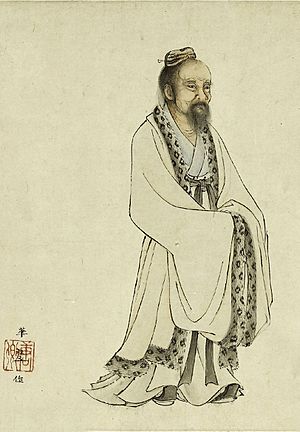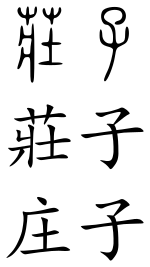Zhuang Zhou facts for kids
Quick facts for kids
Zhuangzi (莊子)
Zhuang Zhou (莊周) |
|
|---|---|
 |
|
| Born | c. 369 BC |
| Died | c. 286 BC (aged c. 82 – 83) |
|
Notable work
|
Zhuangzi |
| Era | Ancient philosophy |
| Region | Eastern philosophy |
| School | |
|
Influenced
|
|
| Zhuangzi | |||||||||||||||||||||||||||||||||||||||||
|---|---|---|---|---|---|---|---|---|---|---|---|---|---|---|---|---|---|---|---|---|---|---|---|---|---|---|---|---|---|---|---|---|---|---|---|---|---|---|---|---|---|

|
|||||||||||||||||||||||||||||||||||||||||
| Traditional Chinese | 莊子 | ||||||||||||||||||||||||||||||||||||||||
| Simplified Chinese | 庄子 | ||||||||||||||||||||||||||||||||||||||||
| Hanyu Pinyin | Zhuāngzǐ | ||||||||||||||||||||||||||||||||||||||||
| Literal meaning | "Master Zhuang" | ||||||||||||||||||||||||||||||||||||||||
|
|||||||||||||||||||||||||||||||||||||||||
| Zhuang Zhou | |||||||||||||||||||||||||||||||||||||||||
| Traditional Chinese | 莊周 | ||||||||||||||||||||||||||||||||||||||||
| Simplified Chinese | 庄周 | ||||||||||||||||||||||||||||||||||||||||
| Hanyu Pinyin | Zhuāng Zhōu | ||||||||||||||||||||||||||||||||||||||||
|
|||||||||||||||||||||||||||||||||||||||||
Zhuangzi (pronounced Jwong-zuh), whose real name was Zhuang Zhou, was a very important Chinese philosopher. He lived around the 300s BC during a time in China called the Warring States period. This was a period when many different ideas and philosophies were discussed, known as the Hundred Schools of Thought.
Zhuangzi is famous for a book named after him, the Zhuangzi. This book is one of the main texts of Taoism, a way of thinking that focuses on living in harmony with nature and the universe.
Contents
Who Was Zhuangzi?
Most of what we know about Zhuangzi comes from a short story in a book called Records of the Grand Historian, written by Sima Qian. This story suggests that Zhuangzi was a minor official from a town called Meng in the state of Song. He lived around the late 300s BC.
Sima Qian wrote that Zhuangzi was inspired by another famous philosopher, Laozi. It's also said that Zhuangzi turned down a job offer from a king because he really valued his personal freedom. He preferred to live simply and freely.
Some experts, like Russell Kirkland, have questioned if Zhuangzi truly existed as a single person. They suggest that the Zhuangzi book we have today might have been put together by a later writer named Kuo Hsiang. However, many still believe Zhuangzi was a real person who shaped these ideas.
What Did Zhuangzi Write?
Zhuangzi is traditionally believed to have written at least some parts of the book named after him, the Zhuangzi. This book has 33 chapters and is divided into three main parts:
- Inner Chapters: These are the first seven chapters. Many believe these were written by Zhuangzi himself.
- Outer Chapters: These are the next 15 chapters. Some think these were written by his students.
- Mixed Chapters: These are the last 11 chapters. These might have been written by other people who shared similar ideas.
The names of these parts might also refer to how their titles were chosen. For example, "Inner Chapters" might get their titles from phrases inside the chapter.
Understanding the Zhuangzi Book
It can be tricky to figure out exactly who wrote each part of the Zhuangzi. Even Sima Qian, who wrote about Zhuangzi's life, quoted parts from the "Outer Chapters" and "Mixed Chapters." These sections feel very much like Zhuangzi's style, even if some experts don't think he wrote them directly.
Some parts of the book, like chapter 33, seem to be a summary of different philosophies from the "Hundred Schools of Thought." This suggests that the book is a collection of ideas from various thinkers, not just one person.
Experts like A.C. Graham have studied the writing style and found different types of ideas in the book. This means the Zhuangzi is more like a collection of thoughts and stories rather than one long, connected argument. It's best to read it as a group of wise sayings and tales.
Zhuangzi's Unique Style
Zhuangzi was known for his clever use of words and his amazing stories, called parables. He used these stories to share his messages and ideas. He often made fun of the strict rules of Confucianism and other historical figures in a funny and sometimes sarcastic way. His writings are full of humor and irony, making them enjoyable to read.
See also
 In Spanish: Zhuangzi para niños
In Spanish: Zhuangzi para niños
 | William M. Jackson |
 | Juan E. Gilbert |
 | Neil deGrasse Tyson |

